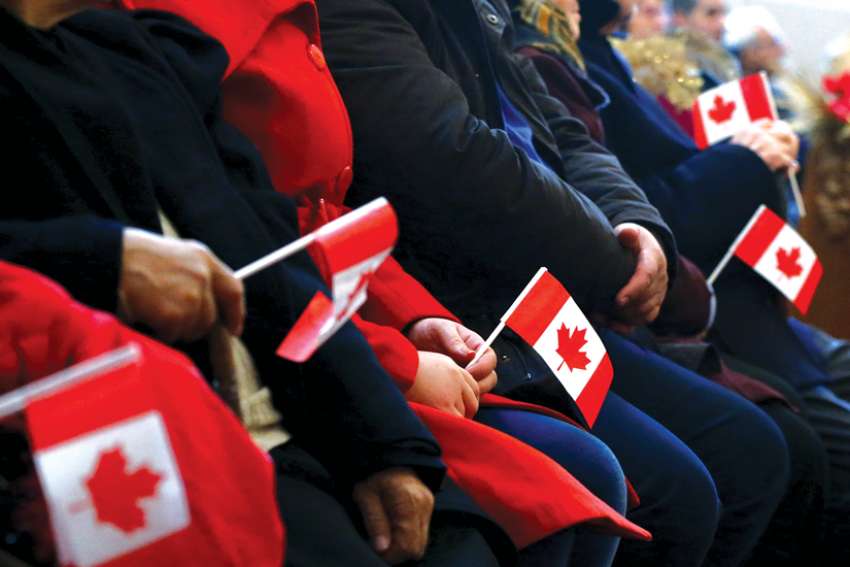Under current plans, private sponsorship groups will resettle almost twice as many refugees as the federal government between now and 2021. Immigration, Refugees and Citizenship Canada (IRCC) projects that private sponsors will bring in 20,000 refugees per year in 2020 and 2021, while the federal government commits to taking in 10,700 per year. The 2019 Immigration Levels Plan calls for 19,000 privately-sponsored refugees versus 9,300 for government-assisted refugees.
“They’ve significantly reduced their refugee resettlement (relative to private sponsorship), which causes us concern,” Sponsorship Agreement Holder Council chair Libby Angel told The Catholic Register.
It’s a matter of Ottawa “doing its fair share,” said Canadian Council for Refugees executive director Janet Dench. “It’s not acceptable that the government bring down its commitment so much.”
From 1998 to 2004, Ottawa resettled 2.75 refugees for every one that came in through private sponsorship. From 2005 to 2014 the ratio of government assisted refugees to privately sponsored was down to 1.58 to one. Under the current government plans the ratio will have flipped to 1.28 privately sponsored for every one government assisted for the 2015 to 2021 period.
Canada permanently resettled more refugees than any other country last year, following two years of dramatic cuts to refugee resettlement in the United States. The 2018 number for Canada was 28,100 out of a total 92,400 refugees who were spread between 25 countries that are part of the global resettlement system.
In the context of a global migration crisis with 25.4 million refugees, 40 million internally displaced people and another 3.1 million asylum seekers scattered across the globe, Canada needs to do more, said Dench.
“Canada is really being called, like other countries, to do its maximum in resettlement of refugees,” she said. “The need is greater than ever.”
Refugee advocates are calling on Canada to make a significant pledge in December when the Global Refugee Forum meets in Geneva. They want the government to match the private sponsorship efforts by pledging to sponsor 20,000 refugees.
“Twenty-thousand would be a good government-assisted level,” Dench said. “It’s absolutely within the capacity of the government and Canada in general. We’ve seen that with the Syrian movement.”
More than 40,000 Syrian refugees came to Canada from 2016 through 2017.
A dramatic increase announced in Geneva might inspire other countries to do more, she said.
But not all private sponsors want the government to expand the government-assisted refugee resettlement program.
“I would push that monies be directed to the private sponsorship of refugees, who have a much better record in terms of integration outcomes,” said Office of Refugees, Archdiocese of Toronto director Deacon Rudy Ovcjak.
Ovcjak also suspects the government refugee program is systematically biased against Christian refugees because it relies on the UN High Commissioner for Refugees to identify refugees for resettlement. A 2016 U.S. study found that while approximately 10 per cent of the Syrian population was Christian, only half of one per cent of the UNHCR-identified Syrian refugees admitted to the U.S. were Christian. For years Orthodox and Catholic bishops in the region have pointed out that Christians avoid the official UNHCR-sponsored camps because they are rife with violent Muslim nationalists who target Christians.
But the UNHCR doesn’t limit itself to refugee camps. It also registers refugees living in urban settings, said Immigration, Refugees and Citizenship Canada spokesperson Nancy Caron in an e-mail. “The UNHCR prioritizes cases based on vulnerability, not on nationality or religion,” she said.
A study of refugee outcomes published by Statistics Canada in March of this year points out that privately sponsored refugees earn more money and are more self reliant than government-assisted refugees, “at least in the initial years.” The earnings gap between privately-sponsored and government-assisted refugees disappears after 10 years in Canada, according to the study.
Most privately-sponsored refugees, even when the sponsorship is backed by a church or community association, are family reunifications. A 2016 study found that 62 per cent of privately-sponsored refugees had direct family ties to their sponsors. In most other cases there are deep ties within immigrant communities.
Whether it involves increases in private sponsorships or government-assisted refugees, Ovcjak does agree that overall numbers have to rise.
“We would be pushing for higher numbers,” he said.


